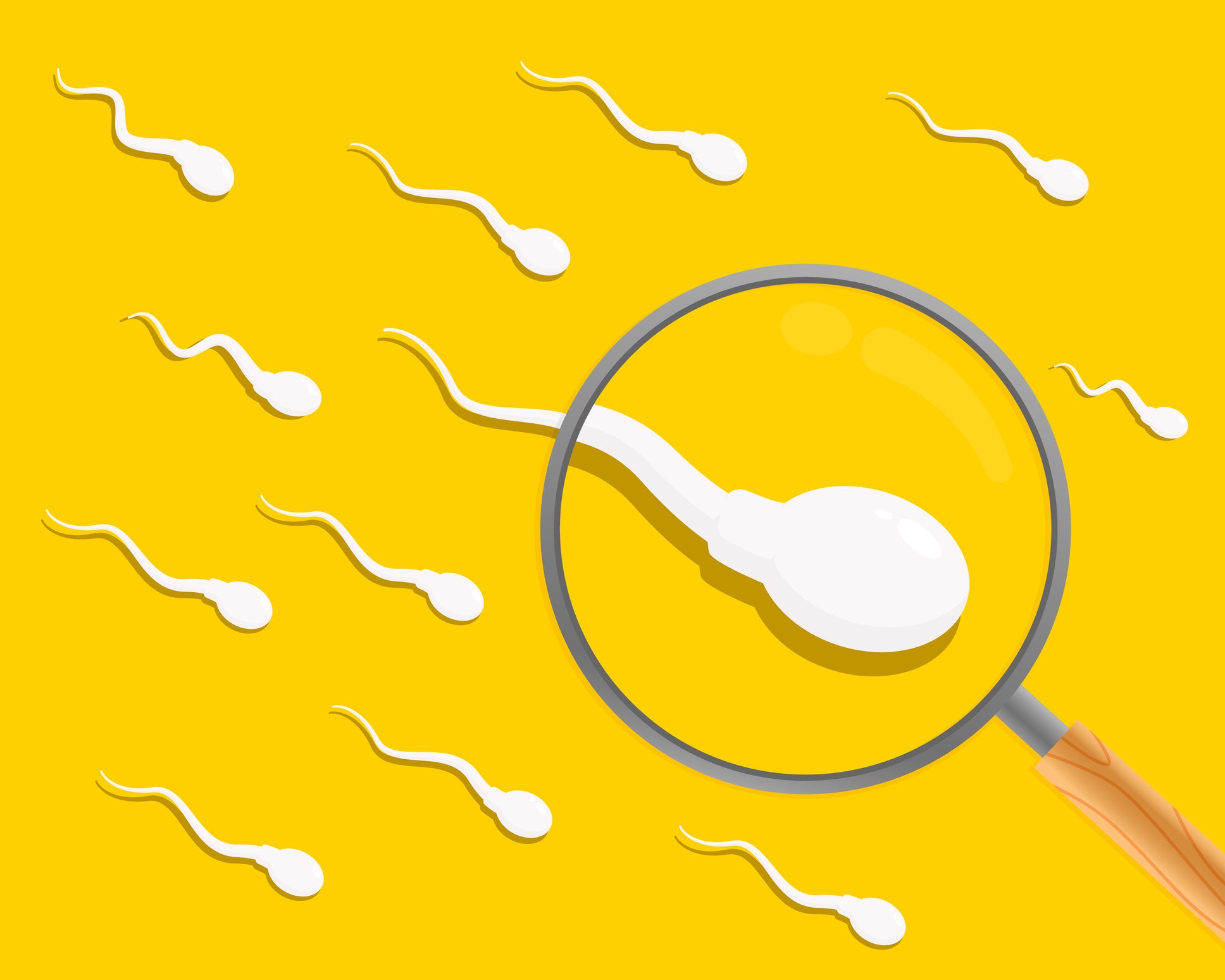-
Can Certain Medications Affect Your Sperm Health?

Man rethinking taking medication.
Often, infertility is assumed to be a woman’s problem. However, male infertility is also significant, and sperm quality can heavily impact the chances of conception. Many factors can affect male fertility, including excess weight, cigarette smoking, excessive drinking, and use of recreational drugs. While all of these factors are commonly known, what is less well known is that certain medication can interfere with male fertility.
How can medications affect a man’s fertility? Often, medication will decrease the production of sperm, but in some cases, medications will affect the function of the sperm itself. Decreased production leads to low sperm count, which means fewer sperm will be available to fertilize an egg. If a medication impacts the motility of the sperm, that means the sperm won’t move as efficiently and will have difficulty reaching the egg. Generally, once a man stops taking medication, it takes at least two or three months for his sperm to recover, since it takes that long for sperm to form and mature. With certain medications, however, it can take months or years for fertility to return to normal, and it might not return at all.
So, what types of medications have a negative impact on sperm? Over-the-counter medication does not usually cause an issue, as long as it’s taken correctly and in the proper dosage. However, it’s important to be cautious when you’re trying to conceive, so it’s wise to discuss any OTC medications with your doctor. Certain OTC medicines warrant particular caution:
- Non-steroidal anti-inflammatory drugs (NSAIDs) sometimes reduce fertility. According to a recent study, men taking 1,200 mg of ibuprofen daily can develop a hormonal condition that causes a problem, especially if the man is older. What was not made clear in the study is whether lower doses of ibuprofen can have the same effect. Additionally, while the effects are reversible when the medication is taken for short periods of time, it’s unclear whether they’re reversible if taken long-term.
- Natural or herbal remedies can cause problems for men trying to conceive. Because herbal remedies are not held to the same regulatory standards as medications, it’s better to stay away from them to protect fertility. Supplements that contain testosterone can be particularly problematic, so avoid anything that uses terms like “male enhancement,” “andro booster,” or “T-booster.”
There are prescription medications that can have a significant impact on fertility.
- Steroids and testosterone therapy can have a strong negative impact on sperm production. In fact, testosterone supplements will completely stop sperm production. Whether the man is taking anabolic steroids, herbal supplements with testosterone, or a prescription testosterone replacement from the doctor, the effect is the same. Testosterone blocks the body’s natural hormonal signals that cause the testicles to make sperm. The result is that the semen will either have a very low concentration of sperm or will have no sperm at all. This effect is reversible, but it takes a long time for the sperm to recover. In fact, it can take six to 12 months for sperm count to get back to normal.
- Chemotherapy can wipe out your sperm count. This is because chemo works by killing rapidly dividing cells, like cancer cells, but also, unfortunately, sperm cells. After cancer treatment, it’s common for men to have no sperm in the semen. However, natural fertility can return one to five years after the treatment is discontinued. If you’ve been through chemo, it’s best to wait at least two years before attempting to conceive. For some people, though, fertility never recovers. If you are about to start chemotherapy, talk to your doctor about freezing your sperm for later use.
- Blood pressure medications can decrease semen volume, sperm concentration, and sperm motility. These medications, especially calcium channel blockers, can also cause decreased libido and erectile dysfunction.
- Opioids can interfere with sexual performance and fertility. Long-term use, in particular, can disrupt the signals that control testosterone production. If you’ve only used opioids short-term, as for the treatment of a broken bone or when recovering from surgery, you may not need to worry.
- Antidepressants can cause a drop in libido and may negatively affect sperm production. Selective serotonin re-uptake inhibitors (SSRIs) are the most common medications used to treat depression and anxiety, and they can hinder your chances of conception. However, there are other medications your doctor or mental health provider can prescribe that won’t have the same impact.
- Other medications may be problematic if you’re trying to conceive. Antibiotics can interfere with testosterone and sperm production, especially an antifungal antibiotic called Ketoconazole. Biologics, used to treat autoimmune disorders, can reduce sperm count, and alpha-blockers, prescribed to treat the symptoms caused by an enlarged prostate, can inhibit ejaculation. 5-alpha-reductase inhibitors like Propecia® and Avodart®, used for hair loss and prostate enlargement treatment, can make it hard to conceive, but the effect goes away when you stop taking them. Anti-epilepsy medications, antiretrovirals, blood pressure medications, and some other medications can also cause fertility problems.
At the Center for Vasectomy Reversal, we are concerned with every aspect of men’s health, and we pride ourselves on helping men improve their fertility through uncompromising, concierge-level patient care. Under the direction of Dr. Joshua Green, our team provides state-of-the-art treatment for men who need a reversal of their vasectomy or have other fertility concerns. To learn more, contact us through our website or call 941-894-6428.
-
How Low Testosterone Can Affect Your Sperm Health

Low testosterone levels can have a serious effect on your sperm health. It’s important to understand why testosterone is so important for effective sperm production, and how you can keep your sperm healthy even if you have low testosterone. In this blog post, we will discuss the relationship between testosterone and sperm health, as well as the potential treatments available to ensure your sperm are in top condition.
What is Testosterone?
Testosterone is a hormone produced by the male body that helps stimulate reproductive organs including the testicles, prostate, and seminal vesicles. It is responsible for the development of secondary sexual characteristics such as facial hair growth, deepened voice, and increased muscle mass. Testosterone plays an important role in maintaining proper sperm production and fertility.
The Role of Testosterone in Sperm Health
Low testosterone levels can lead to decreased sperm count, poor motility (movement), lower quality DNA integrity, and reduced overall semen volume. These factors can all contribute to infertility or difficulty conceiving naturally. Low testosterone levels can also lead to erectile dysfunction or reduced libido which can further impact fertility issues.
Signs That Your Testosterone Levels May Be Too Low
Low testosterone levels can have a huge impact on your health. If you are concerned that your testosterone levels might be too low, read on to learn eight signs that may indicate a problem:
- Decreased Muscle Mass: Muscle mass is an indicator of healthy testosterone levels. If you find that you are losing muscle mass even though you are exercising regularly, it could be a sign that your testosterone levels are dropping.
- Fatigue: Testosterone plays a role in energy production in the body. If you tend to feel tired throughout the day or find yourself needing frequent naps, it could be due to low testosterone levels.
- Loss of Libido: Low testosterone can cause changes in libido, including difficulty getting aroused and decreased sexual desire.
- Decreased Bone Density: One benefit of healthy testosterone levels is increased bone density and strength in men over 30 years old; however, low T-levels can lead to weaker bones and an increased risk of fractures and other injuries.
- Hair Loss: Hair loss is another common symptom associated with lower-than-normal testosterone levels; however, this condition is often attributed to genetics rather than hormone imbalances – so hair loss does not always mean that there’s something wrong with your hormones!
- Irritability: If you’re feeling especially irritable lately, or if small things seem to bother you more than usual, it could be related to lower-than-normal T-levels. A blood test will help determine whether hormonal imbalance may be at play here.
- Difficulty Concentrating: If you find yourself having difficulty concentrating on tasks at work or school lately – or simply having trouble remembering things – then low T-levels may indeed be part of the problem!
- Mood Swings: Mood swings can sometimes occur when testosterone levels become too low. While they aren’t necessarily dangerous (as long as they don’t interfere with daily life), they can indicate an underlying hormonal imbalance that should be addressed, if possible, through lifestyle changes or medical intervention from Centers for Vasectomy Reversal specialists.
Male Fertility Testing Services
The Center for Vasectomy Reversal has many years of experience providing comprehensive male infertility testing services designed specifically to identify any issues related to low testosterone or other issues impacting sperm health that may be preventing conception naturally– contact us today to learn more!
-
Everything You Need to Know About Freezing your Sperm

Why do men freeze their sperm? There are, of course, sperm banks where men can donate sperm to childless couples. This sperm is frozen and kept until it’s needed, but that’s certainly not the only reason for freezing sperm. Men who have been diagnosed with cancer may bank their sperm if their treatment plan is likely to cause infertility. Similarly, men who are undergoing surgery or treatment that could impact their chances of conceiving a child might want to freeze their sperm, and so might men with hazardous jobs. Most commonly, though, couples decide to freeze sperm- and eggs- because they want to wait a little while to grow their families. If you fall into any of these categories, and are considering freezing your sperm, here’s what you need to know.
- Sperm-freezing, also known as semen cryopreservation, is simpler and less invasive than freezing eggs. In fact, while most samples are collected at the fertility clinic, there are home kits available for men who don’t feel comfortable in a clinical setting. Men with low sperm counts are encouraged to freeze a sample ahead of IVF, in case their fresh sample does not contain sperm when it’s time to perform the procedure.
- The cost of freezing sperm varies and is dependent on several different factors. The price includes the entire process, from collection through storage, and varies based on location, individual clinic, and insurance. Typically, it costs anywhere from $250 to $1,000. However, if you intend to store your sample for a long time, the storage costs can really add up. Then, too, there are medical shipping costs to move the sperm from the place where they’re stored to the place where they’ll be used. It’s smart to have a plan in place before you get started, and work with a fertility clinic.
- Some men are better candidates for sperm freezing than others. Healthy people can bank sperm. In fact, even children who have been diagnosed with cancer can bank sperm, for the sake of future fertility. Men who are undergoing chemotherapy should not bank their sperm, and men who have no sperm in their semen won’t be able to, either.
- A doctor has to make the request to bank your sperm. The choice to freeze sperm is a personal one, and one you’ll need to discuss with your doctor. Testing will be required, to screen for sexually transmitted diseases as well as assessing the sperm quality.
- Sperm freezing is low risk. There are no risks to the men themselves, but there is a risk that when the sample is frozen, it may not actually contain sperm. Freezing doesn’t damage sperm, and there’s no increased risk of birth defects for children conceived with frozen sperm. Sperm freezing has been done since 1953, and it’s a very effective method of preserving fertility.
- Men who want to hold off on fatherhood should bank their sperm. Men can father children late in life, so they don’t have the same biological urgency as women to conceive in a certain time frame. However, the risk of certain conditions, including autism, increases when a man passes age 50, so if he’s planning to conceive after that, it’s better to preserve the sperm in advance.
- Semen has no expiration date. Theoretically, sperm can be frozen forever, as long as it’s stored correctly. Sperm that has been frozen for 20 years has still been used to successfully conceive a child.
- Here’s how the process works. Before the appointment, you’ll be asked to abstain from sexual activity for two or three days. Once you get to the clinic, there’s paperwork and bloodwork, and then the sample is collected. Freshness impacts fertility, so it’s best to collect it at the clinic. Once the sample is in the cup, the sperm is analyzed for quantity, shape, and movement, to determine whether more samples are necessary. The sample is divided into different vials and frozen by an experienced lab technician trained to protect the sperm cells with cryoprotectant agents.
Many men freeze sperm before undergoing a vasectomy, but if that wasn’t the case for you, there’s still hope. At the Center for Vasectomy Reversal, we pride ourselves on helping men improve their fertility through uncompromising, concierge-level patient care. Under the direction of Dr. Joshua Green, our team provides state-of-the-art treatment for men who need a reversal of their vasectomy or have other fertility concerns. To learn more, contact us through our website or call 941-894-6428.

Recent Posts
Popular Posts
categories
- Uncategorized
- Sperm Retrieval
- vasectomy reversal
- Emergency
- Dr. Green
- sperm count
- fertility
- male infertility
- MESA
- medical care
- low sperm count
- IVF
- male fertility testing
- anesthesia
- pregnancy
- sperm aspiration
- semen analysis
- post-vasectomy pain syndrome
- infertility
- VE
- anti-sperm antibodies
- older dad
- general anesthesia
- gender reveal party
- post-operative infections
- baby name
- parent
- baby's first year
- fertilization process
- spinal anesthesia
- ACS Fellow
- nutrition tips
- concierge-level care
- fertility planning app
- azoospermia
- out-of-town patients
- V-V
- post-vasectomy reversal
- conceiving
- vasectomy
- vasoepididymostomy
- smoking
- sperm quality
- baby registry
- infographic
- surgical care
- surgical consultation process
- prostate cancer
- baby gender
- family time
- COVID
- Baby Shower
- Child Care
- Halloween Costume Ideas for Babies
- Halloween
- Halloween Safety Tips
- Celebrity Infertility Spotlight
- Postpartum
- testosterone
- Father's Day
- Father
- Men's Health
- Thanksgiving
- Pregnancy Announcement
- Parenting Tips
- Sperm
